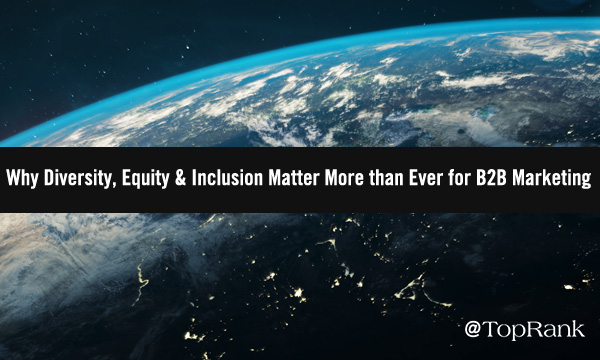
The team at TopRank Marketing asked me to write a blog post on Diversity, Equity and Inclusion in B2B Marketing.
Every introduction I wrote rang hollow. I talked about how representation matters, including a post with an adorable kid overjoyed at seeing himself onscreen in Encanto. I tried starting with a statistic about brand values.
I tried starting with a question: What is a cis straight white guy doing writing a post about diversity, equity and inclusion?
The idea was to follow up that rhetorical question with a post that would justify its own existence.
But it turns out that question isn’t rhetorical at all: It demands an answer. And I don’t have a good one.
So instead of me lecturing about how representation matters, I’m going to put it into practice. I’m dedicating the rest of this post to amplifying other voices.
Diversity Is a Business Imperative: Christy Haubegger, EVP, Chief Enterprise Inclusion Officer at Warner Media

The truth is, the reason that people should want to have a more inclusive workforce is because they want to win. Not because they want to ‘do the right thing,’ but because they want to win.
And inclusion is actually how you win. And there’s a few reasons for that. One is the diversity of perspectives and viewpoints that drives innovation. You need new inputs to get new outputs.
And, frankly, the bigger opportunity is by introducing new voices and new perspectives, it catalyzes different thinking even among the people who are already in that room.
It also prevents the downside of blind spots. If everyone in the room is the same, they have the same perspective. You often have blind spots that the group can’t see. And by having other perspectives in the room, and ideally a complimentary set of blind spots, collectively, you can see everything.
It allows you to see what’s coming and allows you to to understand what the consumer is doing. It allows you to look around corners and see what’s next.
Having different viewpoints around the table who may not agree with you is a challenge to your comfort. But I want to win a lot more than I want to be comfortable.
Watch Christy’s episode of Anne Chow’s Champions for Change.
Eliminate Cultural Bias to Drive Success: Kevin L. Jackson, CISSP, CSSP

A defining characteristic of digital transformation success is a diverse digital culture. This cultural approach maximizes human capital. It also leverages that strength to maintain current customers through the change while simultaneously discovering ways to gain more customers.
Tightly coupling the adoption of digital transformation with the elimination of cultural bias across the organization increases the odds for the success of any business strategy aimed at increasing revenue and margin.
Read Kevin’s article: Unconscious Bias and Digital Transformation
Diversity Is More than “A Seat at the Table:” Theodora Lau, Founder, Unconventional Ventures

We need diversity and not just diversity of gender, but a diversity of voices. I am so tired of going to conference after conference, reading report after report, that always features the same faces, the same voices, the same opinion.
There are so many bright and smart people within financial services and within the startup ecosystem. We need to not only give them a seat at the table but also give them a voice.
Listen to Theodora’s episode of the Framework Podcast.
Equip Employees to Bring Their Whole Selves to Work: Debra Chrapaty, VP and COO, Alexa

When [employees] don’t bring their whole selves to work, companies lose out. Customers lose out. Their peers lose out. Everybody does. So here we have this amazing, incredible light, this resource that we spend a lot for, and then we diminish their ability to have impact because they’re afraid.
… I get on stage and talk about [my wife] Ramona freely. I’ve gotten emails from people saying, “I’ve never had a senior executive talk about their same sex husband or wife on stage in my entire career. Thank you for doing that, because I also have a husband, and it just made me so happy to see that.” Now that person can bring his whole self to work.
Read Debra’s interview for Deloitte Insights
Brands Must Follow Through on Their Rhetoric: Albert Rodriguez, President & COO, Spanish Broadcasting System

We’re seeing existing, major brands step up and take the lead through powerful multicultural campaigns that address real issues that impact all people of color at the forefront. They are changing the game and are forcing other brands to follow.
While it’s become quite the domino effect, and we see the results in our year-over-year revenue growth, there is still a lot of work to be done. Brands need to do more than multicultural marketing; they must also invest in the community and businesses.
Commit to Active Allyship: Tyrona Heath, Director, Market Engagement, the B2B Institute at LinkedIn

Allies can play a significant role in advancing social justice because they are in positions of power and privilege and are often not penalized for speaking out on the cause of diversity and inclusion.
Being an ally may not always be comfortable but it is real. Allyship requires you to confront your biases and play a bigger game by getting to know people unlike yourself and with different points of view.
Read Tyrona’s article: Take the Pledge: How to Be an Active Ally

Comments are Closed